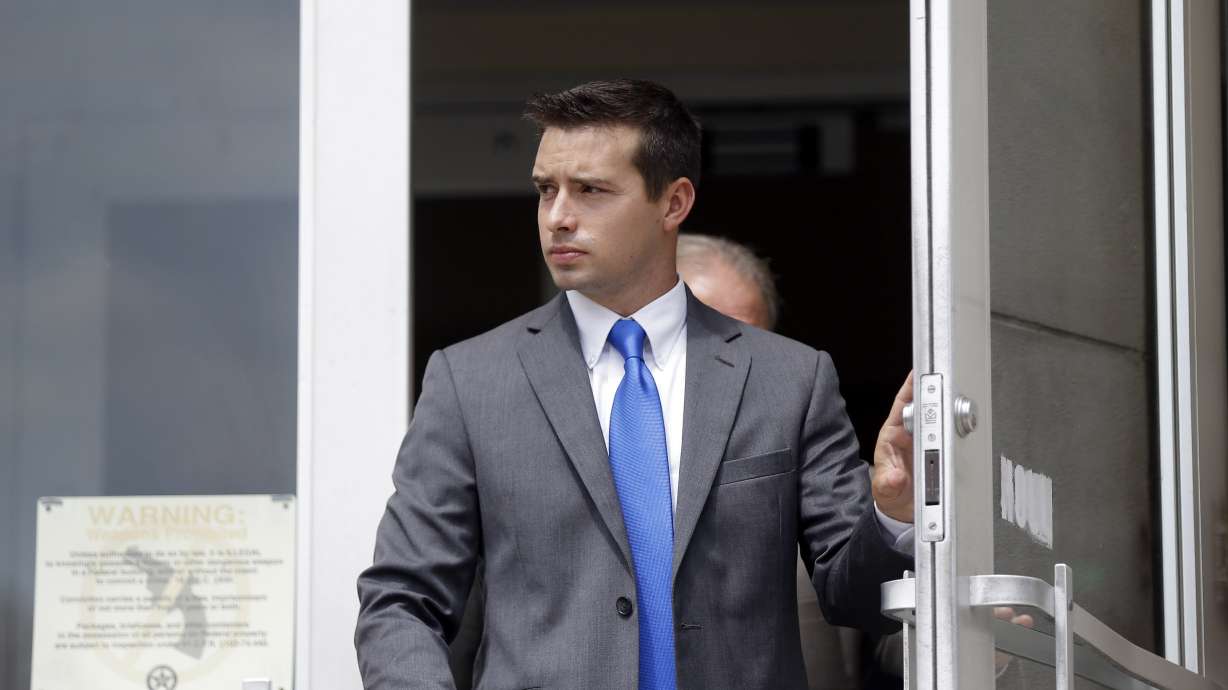Estimated read time: 4-5 minutes
This archived news story is available only for your personal, non-commercial use. Information in the story may be outdated or superseded by additional information. Reading or replaying the story in its archived form does not constitute a republication of the story.
HUNTSVILLE, Ala. (AP) — Federal prosecutors said they plan to retry the Alabama police officer charged with violating an Indian man's civil rights after a jury deadlocked and a mistrial was declared in the case Friday.
Jurors were unable to reach a unanimous verdict in the trial of Madison police officer Eric Parker, who was accused of violating the civil rights of Sureshbhai Patel, 58, and using unreasonable force by slamming him to the ground in February.
Parker has said Patel resisted officers multiple times and he took the man to the ground out of concern for his safety and that of a second officer who was on the scene.
Patel has denied resisting and said through an interpreter that he didn't understand Parker because he doesn't speak English. Video showed Patel turning to look at Parker while his hands were behind his back just before he was slammed to the ground and seriously injured.
Patel had traveled from India and was visiting relatives in suburban Huntsville when he was approached by police during a morning walk. A neighbor who saw Patel called police and reported a thin black man walking through the neighborhood and acting suspiciously.
Defense attorney Robert Tuten has said the confrontation was an unfortunate escalation of police tactics, but not a criminal offense.
Jurors told U.S. District Judge Madeline Haikala once on Thursday and twice on Friday that they were at an impasse, but Haikala asked them to try "one last time" to reach a verdict as she cited the trial's financial and emotional cost. She also noted that a retrial wasn't certain to result in a different outcome.
A jury note that Haikala read aloud in court said members of the panel hadn't changed their positions on the case since deliberations began anew Thursday morning. Deliberations first began Wednesday night but a juror was dismissed for travel issues and an alternate was appointed.
"Just like with any other group of people, we all come to that group with our own views and our own baggage from life," Tuten said on his way out of the courtroom. "Besides the criminal aspects of this case, I think we're dealing with an important social issue here and everybody has a perspective and an opinion about that and some of them are different than others."
First Assistant U.S. Attorney for the Northern District of Alabama Robert Posey said a retrial is likely within 70 days unless a motion for continuance is filed in the case.
"Our team is gonna go back and huddle up and review, as you might expect, everything we've done and see if there's anything that we want to change," Posey said, adding that all the evidence in the case has been presented.
Parker denied intending to harm Patel when he took him down, saying he didn't use any particular technique, but slipped and fell. Parker also said he had taken subjects down using a similar move in the past without any injuries.
Patel suffered spinal trauma and prosecutors said he wouldn't have fallen with such force if his legs hadn't been deliberately swept from under him.
University of Alabama assistant law professor Stephen Rushin used video of the encounter in lessons on police misconduct and said prosecutors' burden of proving an officer's willfulness in criminal cases makes it very difficult to secure convictions.
"The best course of action in both kinds of case, civil and criminal, is to use the department's rules of conduct, manual, or training guidelines as the standard of care and go on to show that the officer violated his department's own rules," Richard Delgado, University of Alabama John J. Sparkman Chair of Law, said in an email.
Several of Parker's colleagues and trainers said the takedown wasn't part of any training program. Some offered conflicting testimony on how and when force should be used, if Parker's was necessary, and if it violated training guidelines.
"It's much easier to secure redress in a civil action, which is why you see relatively few criminal cases against officers and many more civil ones, which are often settled for large sums," Delgado said.
Patel filed a civil lawsuit seeking an unspecified amount of money for his injuries and Parker also faces a state assault charge. His termination is pending until the criminal case is resolved.
Copyright © The Associated Press. All rights reserved. This material may not be published, broadcast, rewritten or redistributed.









